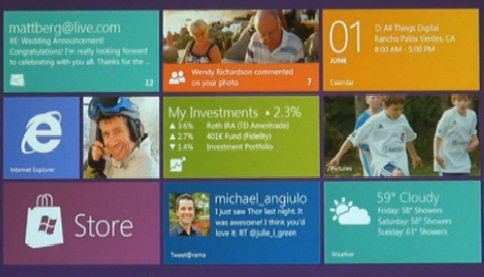

In the quarters leading to the release of Windows 7, Microsoft devoted reams of digital ink to discussing not only the features, but also the development philosophy undergirding the operating system. Whether or not that contributed in any meaningful way to Windows 7’s eventual success (pent-up demand after nearly a decade of Windows XP might have been more of a factor), Microsoft seems ready to employ that strategy again with Windows 8.
To that end, the company is kicking off a “Building Windows 8” blog, with regular postings devoted to the development of the next-generation operating system. Various Microsoft employees will almost certainly use the space to defend some of the more radical decisions associated with the new interface, including the abandonment of the “traditional” Windows desktop model in favour of colourful, Windows Phone-style tiles.
In the two months since its Windows 8 preview in June, Microsoft has defended this about-face in its user-interface as the best possible way for Windows to operate on both PCs and tablets. Certainly a touch-ready UI would allow Microsoft to compete in the burgeoning tablet market, currently dominated by Apple’s iPad.
“So much has changed since Windows 95 – the last time Windows was significantly overhauled – when the ‘desktop’ metaphor was established,” Steven Sinofsky, president of Microsoft’s Windows and Windows Live division, wrote in the inaugural 15 August posting. “Today, more than two out of three PCs are mobile (laptops, netbooks, notebooks, tablets, slates, convertibles, etc.). Nearly every PC is capable of wireless connectivity.”
Microsoft plans on revealing more about Windows 8 at its BUILD conference in September. “In the next weeks we will just start talking specifics of features, since there is no obvious place to start given the varying perspectives,” he wrote. “From fundamentals, to user interface, to hardware support, and more, if something is important to you, we promise we’ll get to it in some form or another.”
Even with its newfound focus on mobile form-factors such as tablets, Windows 8 faces at least one substantial obstacle to widespread adoption: Windows 7, which has sold hundreds of millions of copies since its October 2009 debut. In a recent research note, Gartner predicted Windows 7’s presence on 42 percent of PCs by the end of 2011 – helping finally topple Windows XP, that aging but solid warhorse of many a company’s IT infrastructure, from its longtime spot as the world’s dominant operating system. Will consumers and businesses, having been pushed by Microsoft to adopt Windows 7, rush out for the Windows 8 upgrade?
That remains a crucial question for Microsoft to answer in the affirmative. As Windows 8’s reported 2012 release date approaches, the company will doubtlessly pour hundreds of millions of dollars into its marketing efforts. This new blog is just the beginning.
Binance BNB token rises after WSJ report the Trump family is in talks to secure…
After failed Amazon deal, iRobot warns there is “substantial doubt about the Company's ability to…
Community Notes testing across Facebook, Instagram and Threads to begin next week in US, using…
Complete 180. FTC attorney now says federal agency can pursuit Amazon trial, after citing “severe…
Former board member and respected chip industry veteran Lip-Bu Tan appointed to lead troubled US…
MPs demand secret High Court hearing be held in public, after government had ordered a…